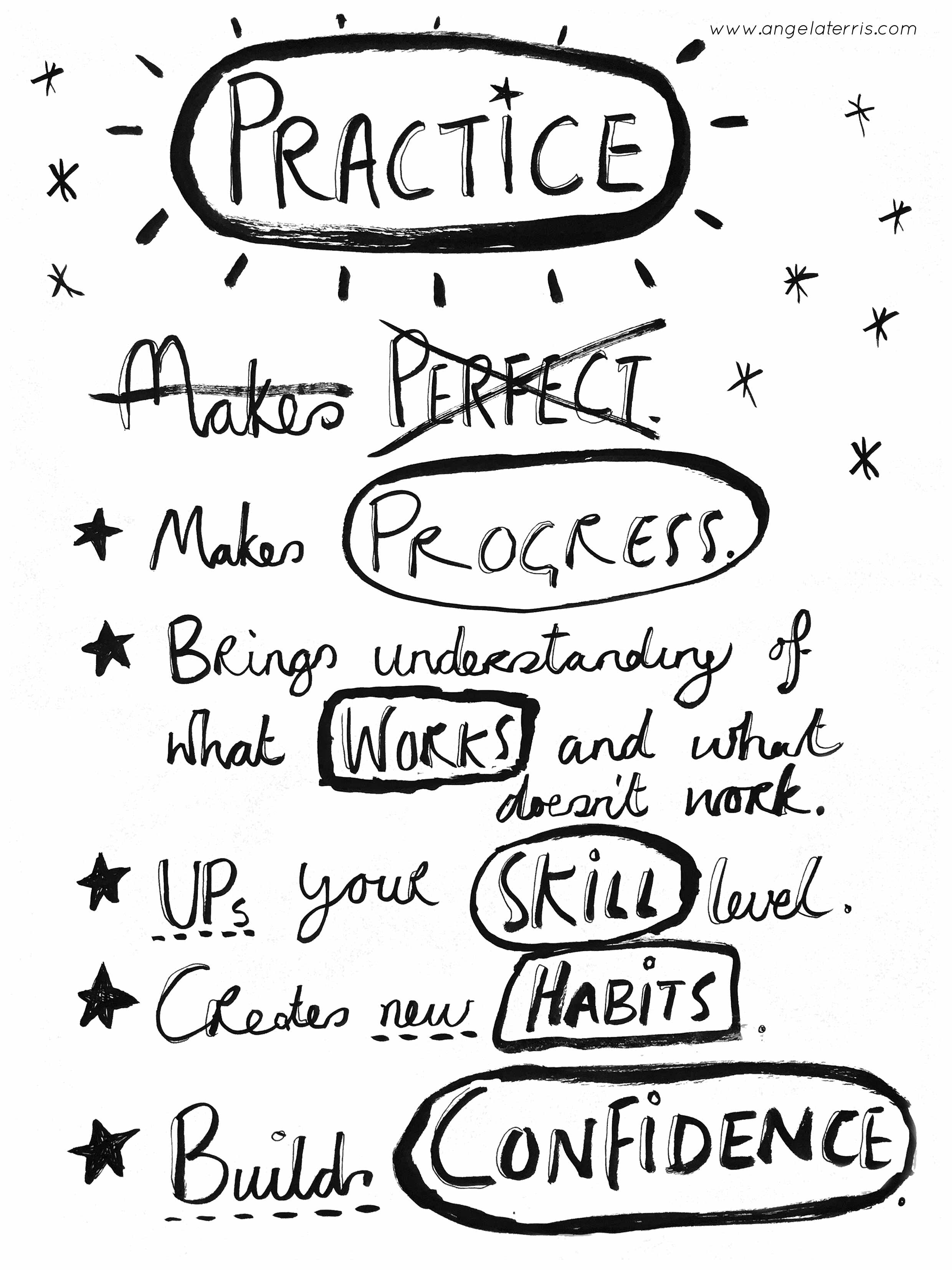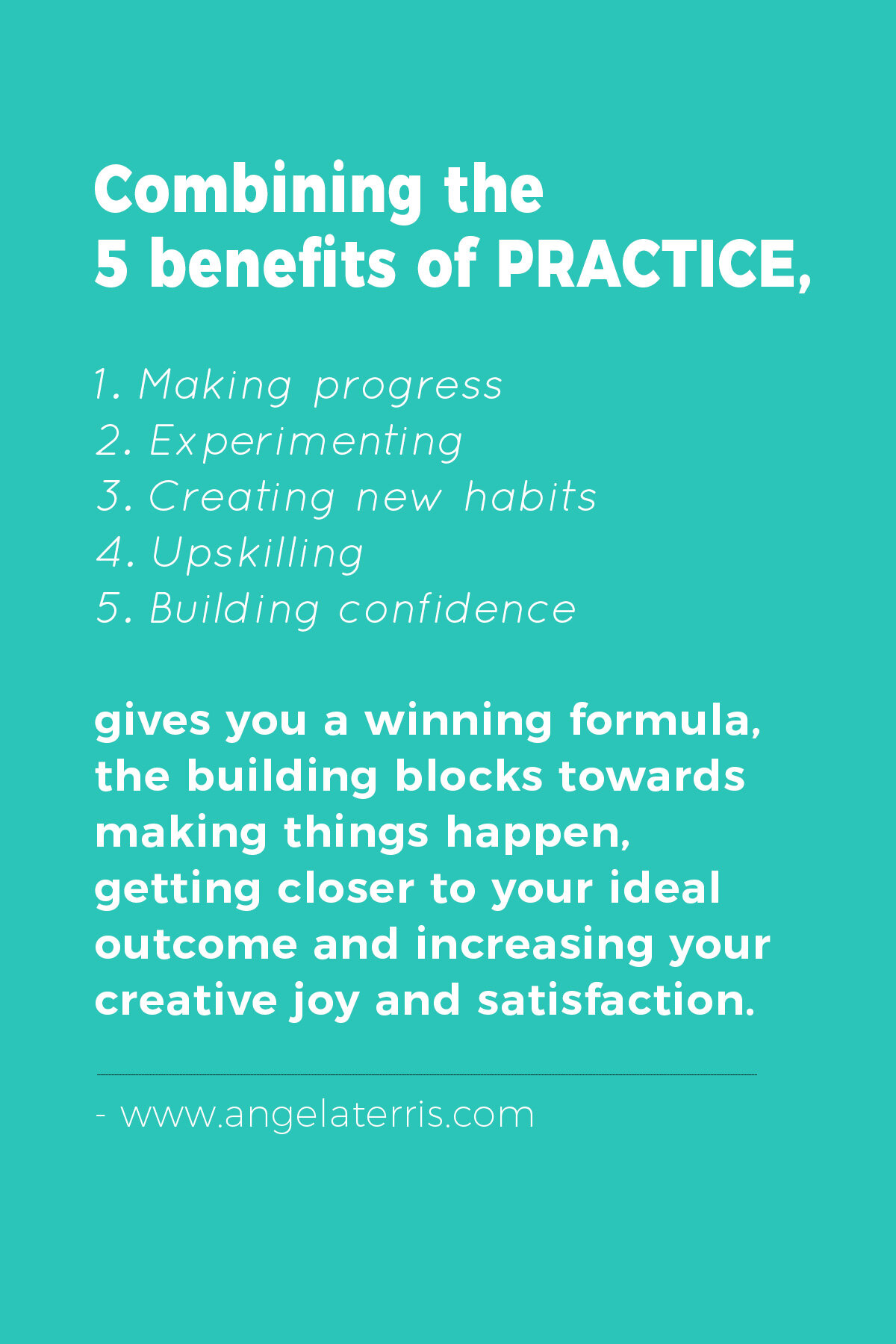Stop The Perfection and Aim For ‘Practice Makes Progress’ Instead.
‘Practice Makes Perfect’ is such a well-known saying, and in a way it is true.
Perfection is the aim for the highest degree of excellence or quality, whilst Practice is the repeated performance to acquire skill or proficiency.
Practice is the pathway to perfection.
A poster I designed to help me remember to let go of perfection.
The Problem with aiming for Perfection
Perfection does have its place, it gives you something to work towards, gives focus, and clarity. The problem happens when it turns into a habit of 'how' you automatically do things. When it's switched on all the time without checking if what you are doing right now warrants such high standards and becomes ingrained in your personality.
Aiming for perfection, for perfection's sake, can be addictive when it becomes the sole point of what you do and can impact on your motivation behind your work. Are you creating purely for achieving perfection or for the unbounded self-expression and passion for your work?
Perfectionists believe that other people are not OK with them unless they are seen to be trying hard in their endeavours, resulting in them putting 110% into everything they do.
I had a female coaching client who worked in a male-dominated industry and she felt that she had to go above and beyond to prove herself and to progress, she had to be better than her colleagues to get there. The client eventually burnt herself out from overachieving to the point of taking time off work for stress.
Perfectionists need to get comfortable with giving 95% effort instead of 110%, which will feel uncomfortable and vulnerable for them; hence why the habit is kept going unchecked to ensure they feel safe and accepted.
Perfection can be:
A form of procrastination, especially if you have 'all or nothing' thinking style, i.e. if I can't do it perfectly then there is no point doing it at all.
Hides a sense of inadequacy and insecurities of not feeling good enough and fear of negative judgments from others.
Adds performance anxiety which can impact on creating easily and effortlessly.
Distracts from allowing new inspiration to enter unhindered and giving it the potential to breathe.
Impacts on your self-confidence as it comes from a self-critical place, where you are judging yourself too harshly.
Feeling defeated if you don't reach your high expectations, to the point you may just give up.
Robs you of being in the present moment, enjoying what you are doing right now.
Can isolate you from people as others may feel they can't live up to your high standards and move onto people who are less exacting.
I now say, 'Practice Makes Progress', as I find it is more flexible and forgiving. As a perfectionist myself I know the dangers of its illusionary trap. Practice makes progress, for me, comes from a less critical place and encourages exploration whilst enjoying the process for what it is.
5 Benefits of Practice Making Progress over Perfection
One: It helps you make progress
Progression is all about those small incremental steps forward. It allows for advancement. Often when aiming for perfection you can discount those small steps forward as irrelevant and any tiny wins as unimportant. Recognising the importance of those small steps and wins contributes to boosting your confidence and building self-assurance in your abilities.
Two: Brings an understanding of what works and what doesn't work
With practice, experimentation is given room and becomes a vital part of the process. This is what creativity is all about, mixing things up to create the new. It's where the magic happens.
Three: Ups your skill level
Practising improves your ability and practical knowledge. It's through these little acts that you can hone your craft. It helps you find more efficient ways of doing things leading to creating inflow and with ease.
Four: Creates new habits
To get the work done we need to commit to it. That book won't get written, the exhibition won't happen or the gig won't get booked if you don't show up and practice. Getting the creative habit of regularly doing the work stops you from just dreaming about it, helps you overcome your fears and gets you to, wow, I have done that!
Five: Builds confidence
Often people think they need confidence first before they can do something, that getting confidence is the spark that they need. However, confidence builds when you do those little acts and start to achieve small success. They all help to increase your self-assurance in your talents and faith that things will work out in your favour. Practice and progress come first and with it, confidence grows.
Lets Recap
Aiming for perfection can be a good thing as it gives focus, direction and drive.
It becomes a problem when we use it as a default coping mechanism to deal with life and it becomes an ingrained part of your personality.
Remember, what perfection means, it is... THE ACT OF PERFECTING SOMETHING.
When you re-frame perfection to perfecting it becomes less precious and more doable.
Don't forget the action part of perfections meaning. The getting better and better at something over time, like building on skills, acquiring knowledge, improving communication, feeling safer in sharing your work, and more.
Finally, let go of perfection and embrace the act of perfecting.
Free e-book to boost your creativity.
These key tips will help you keep on track, keep showing up, and feeling super satisfied with your creativity whether you are just starting, a passionate hobbyist, or a powerhouse professional.
Fill in the form below to download your free 30 Tips!
*Please note your e-mail will automatically be added to my newsletter list. You can unsubscribe any time.

